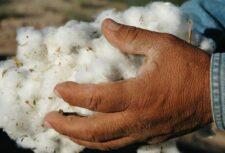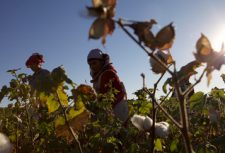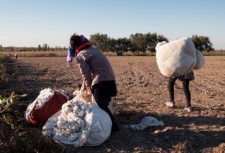Disclaimer: This article is more than 11 years old, and may not include the most up-to-date information or statistics. Please verify information with more recent sources as needed, and if you have any questions contact our Press Office.
20 December 2012
The 2012 cotton harvest in Uzbekistan has concluded, and the system of forced labour of cotton production remained the same as in previous years. The Uzbek-German Forum for Human Rights and the Cotton Campaign (of which Anti-Slavery International is a member) released the Review of the 2012 Cotton Harvest, which explains that implementation of the forced labour system was carried out with a demographic shift to older children and more adults, accompanied with an unprecedented scale of corruption.
The Review presents observations by human rights defenders throughout Uzbekistan, and highlights the following disturbing trends:
- continued forced child labor despite a demographic shift of the burden to older children,
- intensified forced labor of adults,
- continued rejection of independent monitoring,
- continued harassment of Uzbek citizens who attempted to monitor, and
- increased extraction of financial and other resources from Uzbek citizens by government authorities.
“Despite the government of Uzbekistan’s steadfast rejection of monitoring by the International Labour Organization and repression of human rights activists, a network of dedicated and brave Uzbek citizens documented the 2012 harvest to make this report possible,” said Bennett Freeman, Senior Vice President for Social Research and Policy, Calvert Investments. “Their findings present a call to action to governments, companies and investors to use their leverage to urge the government of Uzbekistan to end the forced labor of children and adults in its cotton sector.”
For the first time in many years, the majority of primary schools were not closed, reportedly under orders from Uzbekistan’s Prime Minister. However, forced labor of children as young as age 10 continued sporadically, and nationwide, children ages 15-17 were forced to pick cotton under threat of expulsion from school.
“The demographic shift orchestrated by Tashkent during the 2012 cotton harvest indicated the government’s interest in allaying international pressure, but the continuation of the state-sponsored forced labor system of cotton harvesting evinced that the government has yet to make any progress in application of its national laws and international commitments on forced labor and the worst forms of child labor,” said Shin Young Chung, Attorney at Law, Advocates for Public Interest Law.
Throughout Uzbekistan, an estimated 16% of all government employees, including doctors, nurses and other essential service providers, were ordered to pick cotton under threat of losing their job, salary or benefits. Teachers were particularly targeted, with 60% of educators from each school sent out of the classrooms to pick cotton.
“Not only were teachers’ basic rights violated, the schoolchildren who were spared from picking cotton this year were still denied the education they are entitled to because of crowded classrooms and missing teachers,” said Lorretta Johnson, secretary-treasurer of the American Federation of Teachers and co-chair of the Child Labor Coalition. “With doctors and nurses among the government employees forced into the cotton fields, citizens across the country also had trouble getting essential health care. This violation of the rights of public sector employees is an affront to worker’s everywhere and detrimental to the people of Uzbekistan.”
“The 2012 cotton harvest was also characterized by unprecedented levels of corruption,” said Umida Niyazova, Director, Uzbek German Forum for Human Rights. Government authorities extorted payments from parents who attempted to protect their children, adults who could not meet their quotas, and local businessmen under threat of tax penalties. Unprecedented numbers of adults sent to pick cotton did not receive any payment for the cotton they picked.
“What does it take for companies to take action to ensure that they are not complicit in the forced labor in Uzbekistan?” asked Dr. Mark Zirnsak, Uniting Church in Australia. The report highlights the human rights due diligence responsibilities of companies to prevent complicity in the Uzbek forced labor system, by eliminating Uzbek cotton from supply chains and, if operating in Uzbekistan, establishing independent monitoring and public reporting.
“This report is another message to governments to account for human rights in their economic and diplomatic relations with Uzbekistan,” said Dr. Miriam Saage-Maasz, Business & Human Rights Program Director, European Center for Constitutional and Human Rights. “Under what justification does the government of Uzbekistan merit continued preferential trade treatment while demonstrating no commitment to end the practice of forced labor?”
Joanna Ewart-James, Anti-Slavery International’s Supply Chain Programme Co-ordinator said: “This report shows why it is absolutely essential that companies using cotton in their products cannot be complacent, despite often lengthy supply chains. Companies must undertake the practical steps set out by the cotton campaign to ensure that they are not to complicit in the use of state-sponsored forced labour.”
The report Review of the 2012 Cotton Harvest is available in the PDF format here.
The Cotton Campaign is the global coalition of worker, employer, investor and human rights organizations coalesced to build political will in the government of Uzbekistan to end forced labor of adults and children in its cotton sector. The Uzbek – German Forum for Human Rights (UGF) is a German based NGO aimed at improving the human rights situation in Uzbekistan and strengthening and promoting civil society, and a participant in the Cotton Campaign.





